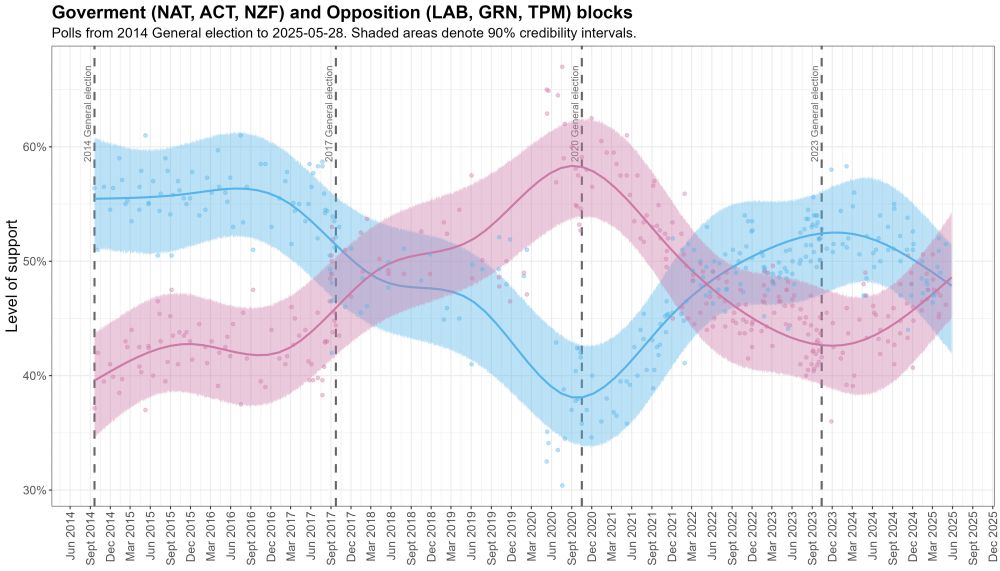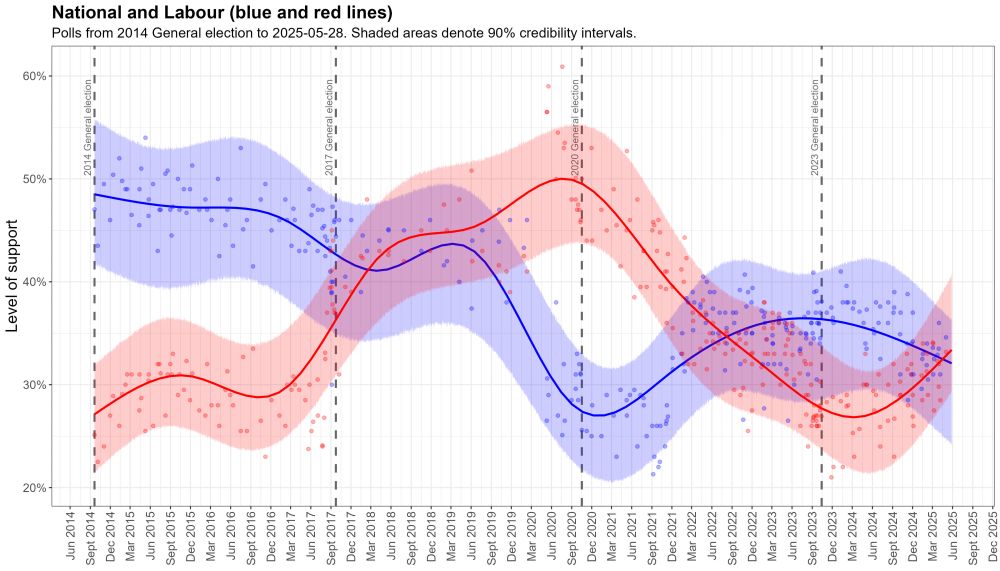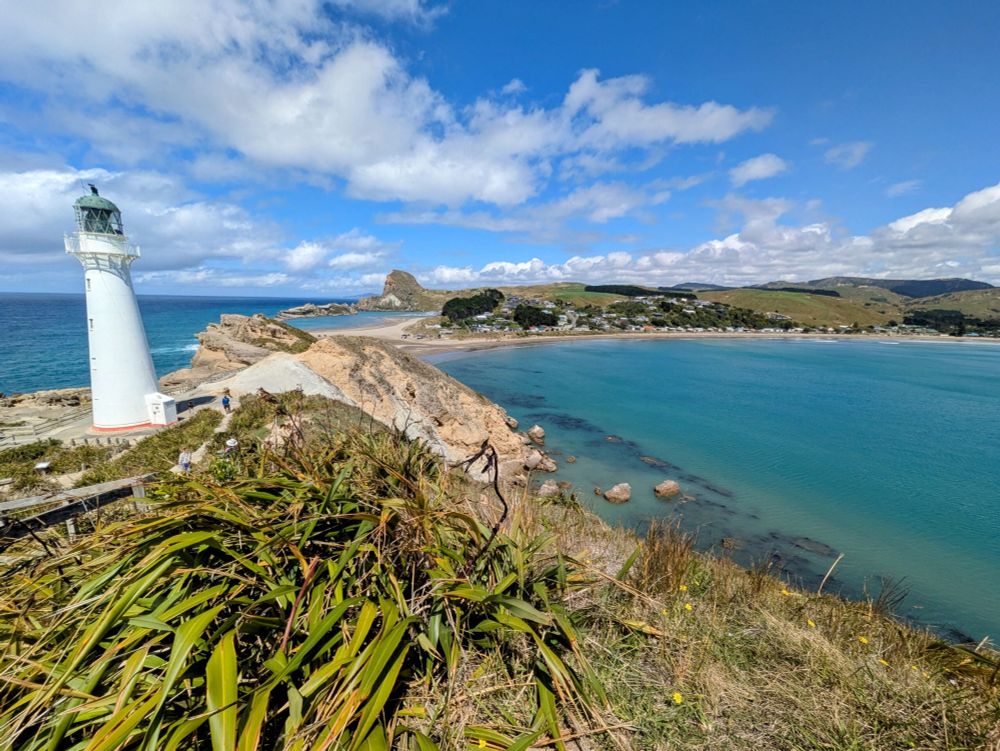At least it gives me an opportunity to make nice graphs
28.05.2025 06:33 — 👍 2 🔁 0 💬 0 📌 0
Idk but if you pay me $799 than I can work it out
28.05.2025 06:33 — 👍 3 🔁 0 💬 0 📌 0
Two things remain on my to-do list:
1/ Assess how well the model performs at predicting the outcome of previous elections ("out-of-sample" performance); and
2/ Incorporate economic variables, such as unemployment, inflation, and interest rates, into the model.
28.05.2025 05:58 — 👍 3 🔁 0 💬 1 📌 0
Note the model accounts for:
- Sampling size ("uncertainty")
- House effects for individual pollsters
- Public versus internal polls
- Trends (by party)
28.05.2025 05:58 — 👍 4 🔁 1 💬 1 📌 0
The main findings are (see above figures for eye-candy):
1/ Support for the Government (light blue) and Opposition (rose) blocks is neck-and-neck, as are National (dark blue) and Labour (red); and
2/ Support for the smaller parties is sitting at similar levels to the last general election.
28.05.2025 05:58 — 👍 5 🔁 0 💬 1 📌 0
Put simply, turbo-charging urban development can complement the provision of infrastructure to rural areas, and vice versa.
I enjoyed writing the post and hope you enjoy reading it. Ka kite! Thanks again to @greaterauckland.bsky.social for facilitating these conversations.
12.05.2025 22:12 — 👍 3 🔁 0 💬 0 📌 0

The post finishes by observing how improving infrastructure in New Zealand's remote / rural communities can also deliver tangible value to urban areas, by providing access to obscenely beautiful natural environments. Like Wharariki Beach.
12.05.2025 22:12 — 👍 3 🔁 0 💬 1 📌 0
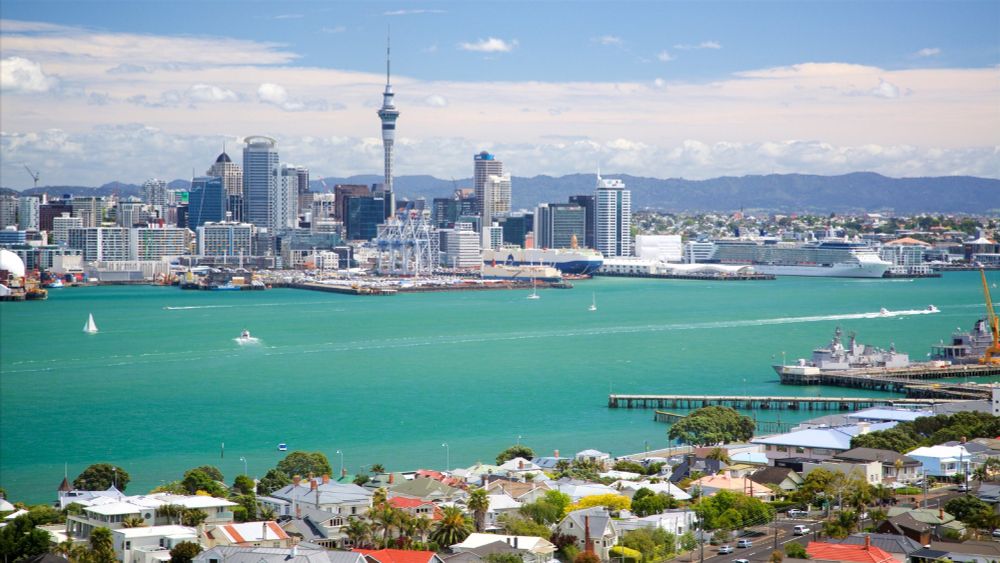
Infrastructure "cross-subsidies" from urban to rural areas are already happening, of course, and have happened for eons. For me, the focus should be on ensuring New Zealand has a sufficiently large and prosperous urban core to sustain these cross-subsidies into the future.
12.05.2025 22:12 — 👍 5 🔁 1 💬 1 📌 0
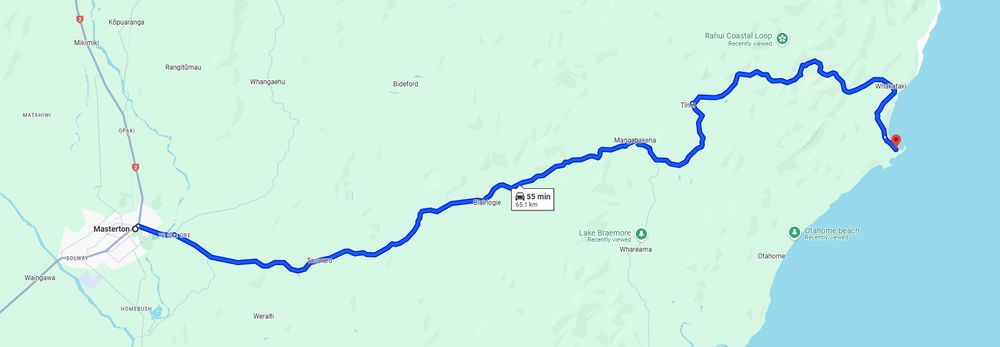
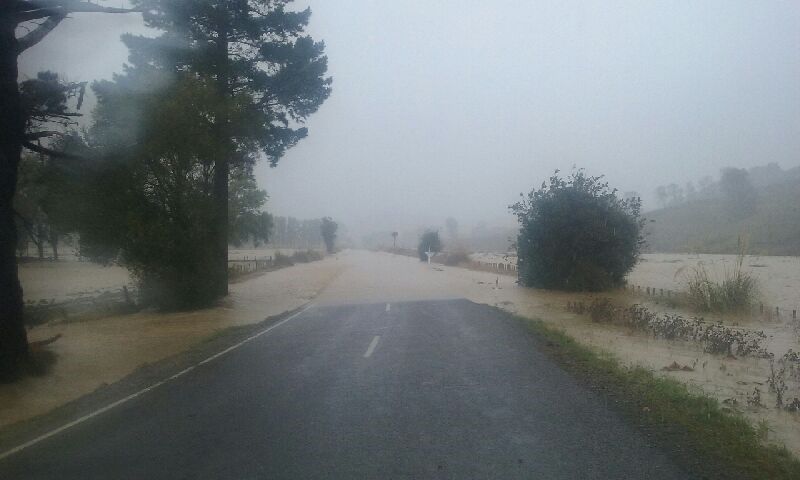
The post discusses how adopting policies to strengthen the urban core, such as upzoning to enable housing, can support remote, rural communities.
How? Well, it spreads the fixed costs of providing infrastructure over more people, reducing costs per person. E.g. the road to Rangiwhakaoma.
12.05.2025 22:12 — 👍 5 🔁 1 💬 1 📌 0


A great LinkedIn post inspired by a talk by @studonovan.bsky.social
“Making the most of our city means allowing more housing where the market wants it to be.”
03.04.2025 08:41 — 👍 10 🔁 2 💬 0 📌 0

Home | Motu
Promoting well-informed and reasoned debate on public policy issues that matter to New Zealanders.
Fwiw Motu Research is an independent economics and policy research institute based in Wellington, New Zealand.
In our work, we seek to help decision-makers grapple with complex social, environmental, and economic issues.
Put Q's here or send me a message 💪💪💪
More information about us:
www.motu.nz
01.05.2025 18:59 — 👍 0 🔁 0 💬 0 📌 0
To apply, please email:
⭐ A cover letter + CV addressing the requirements for the position you are applying for
⭐ Copies of (or links to) three papers you have co-authored
⭐ Contact details for three people who are willing to act as your referee
📧 director@motu.org.nz
01.05.2025 18:59 — 👍 0 🔁 0 💬 1 📌 0
Applications for Research Fellow and Senior Fellow | Motu
Do you have:
❓ a passion for research
❓ a PhD (or, are close to getting one)
❓ the desire to live + work in New Zealand
If you answered ✅ ✅ ✅, then you might want to consider applying for Research Fellow or Senior Fellow positions with us at Motu Research.
More deets:
www.motu.nz/about-us/wor...
01.05.2025 18:59 — 👍 5 🔁 1 💬 2 📌 0
Alternatively, if you can't make it along to either of these two events but are keen to catch-up separately, then please send me a message and we can try and set something up.
06.03.2025 22:02 — 👍 0 🔁 0 💬 0 📌 0

Auckland 2050 - Building the Future City 2 April 2025 | Property Foundation
Our expert panel explored the relevant tech and it’s applications, how to integrate AI into your business and highlighted important legal aspects.
Second, from 5.30-7.30pm I'm contributing to a panel event titled "Auckland 2050: Building the Future City" at the Auckland University of Technology, where I'll be making the case for a bigger and better Auckland.
You can register for this event here:
tpf.org.nz/auckland-205...
06.03.2025 22:02 — 👍 2 🔁 1 💬 1 📌 0

Urban policy reforms in New Zealand
Where are we now and where might we head next?
First, from 10.30-11.30am I'll be giving a talk on urban policy reforms in New Zealand at the University of Auckland. Notwithstanding a decade of progress, I'm going to make the case for wider and deeper reforms.
You can register for this event here:
www.eventbrite.co.nz/e/urban-poli...
06.03.2025 22:02 — 👍 3 🔁 1 💬 1 📌 0
To my dear friends in my beloved Tāmaki Makaurau Auckland, New Zealand -- I'm pleased to be visiting your verdant shores on *2 April* for two public events that some of you might be interested in coming along to.
Find links to details + register below.
06.03.2025 22:02 — 👍 8 🔁 3 💬 2 📌 0
It'll depend on the context but high land prices supporting higher density development seems intuitive to me. But we might have achieved better outcomes from allowing 4-10 storeys in more places.
16.02.2025 06:38 — 👍 2 🔁 0 💬 0 📌 0
Thanks to Matt for his efforts, several people for helpful comments on an earlier draft, my employer Motu for supporting unfunded research, Land Use Policy for publishing what is an unusual paper, and the Vrije Universiteit Amsterdam for paying the open access fee.
Onwards and upwards!
12.02.2025 20:27 — 👍 1 🔁 0 💬 0 📌 0
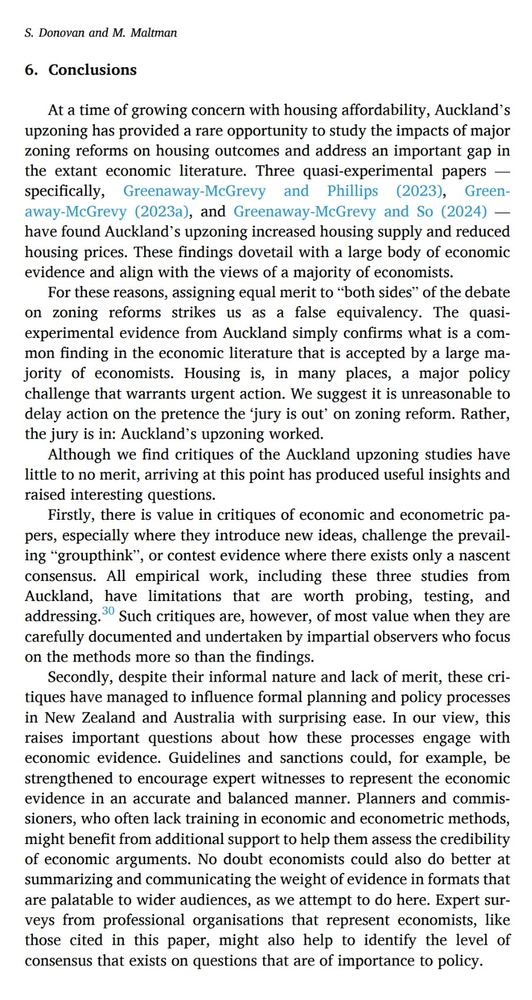
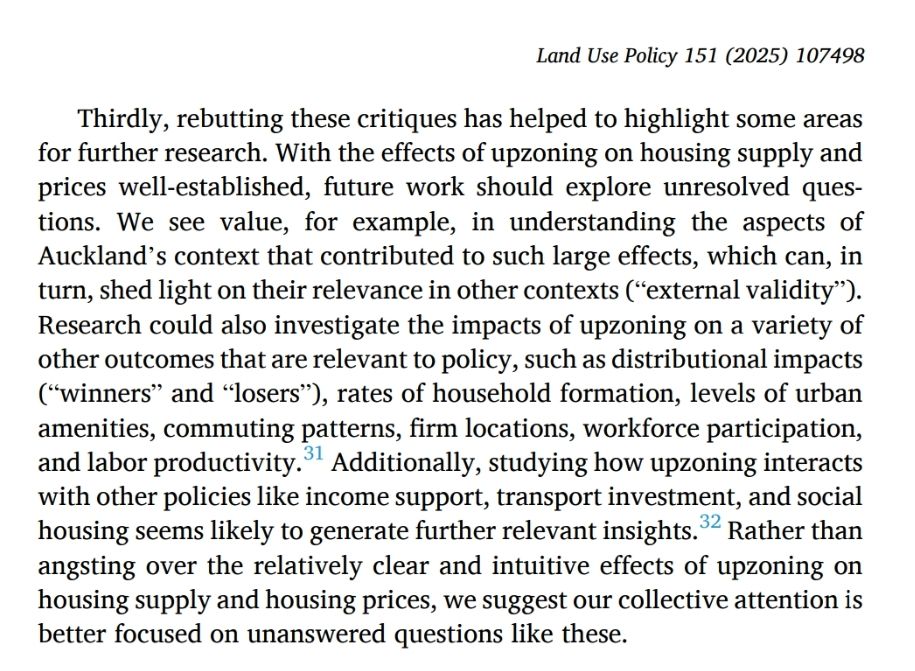
Main takeaways:
- the evidence suggests upzoning in Auckland led to more supply and lower rents
- these findings hold under plausible assumptions and are very robust to changes in those assumptions
- all available evidence indicates upzoning had large effects
The conclusions sum up where we stand.
12.02.2025 20:27 — 👍 3 🔁 0 💬 1 📌 0
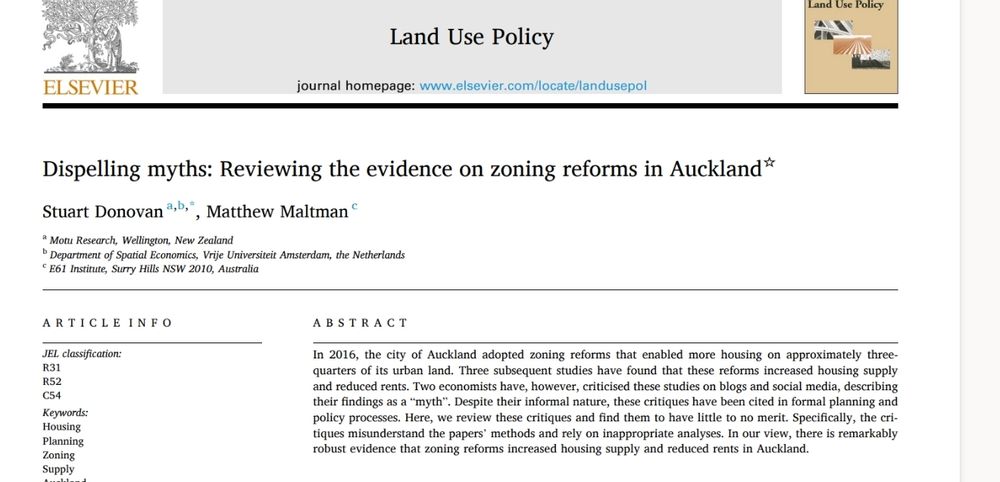
🚨 urban economics research siren 🚨
In this recently published (open access) paper in "Land Use Policy", my co-author (Matthew Maltman) and I review critiques of the economic evidence on the effects of upzoning in Auckland.
We find these critiques have little to no merit.
doi.org/10.1016/j.la...
12.02.2025 20:27 — 👍 13 🔁 8 💬 1 📌 1
yes and the response is surprisingly large for a suburban location.
20.01.2025 23:10 — 👍 0 🔁 0 💬 0 📌 0
* Credit to the authors Ryan Greenaway and Matthew Maltman as well as all the elected representatives and public servants at Lower Hutt that advanced these ambitious reforms.
20.01.2025 08:44 — 👍 0 🔁 0 💬 0 📌 0
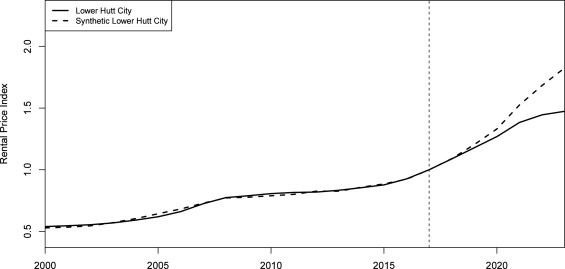
And just like in Auckland, the synthetic control method shows rents falling soon after the reforms with the size of the effect growing with time.
Honestly, this is beautiful.
20.01.2025 08:44 — 👍 2 🔁 0 💬 1 📌 0
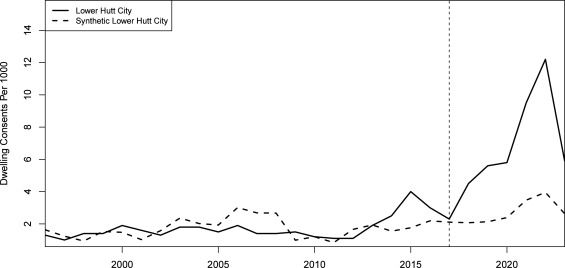

Like Auckland, the paper presents data showing a big spike in housing permits especially for apartments and townhouses.
20.01.2025 08:44 — 👍 0 🔁 0 💬 1 📌 0
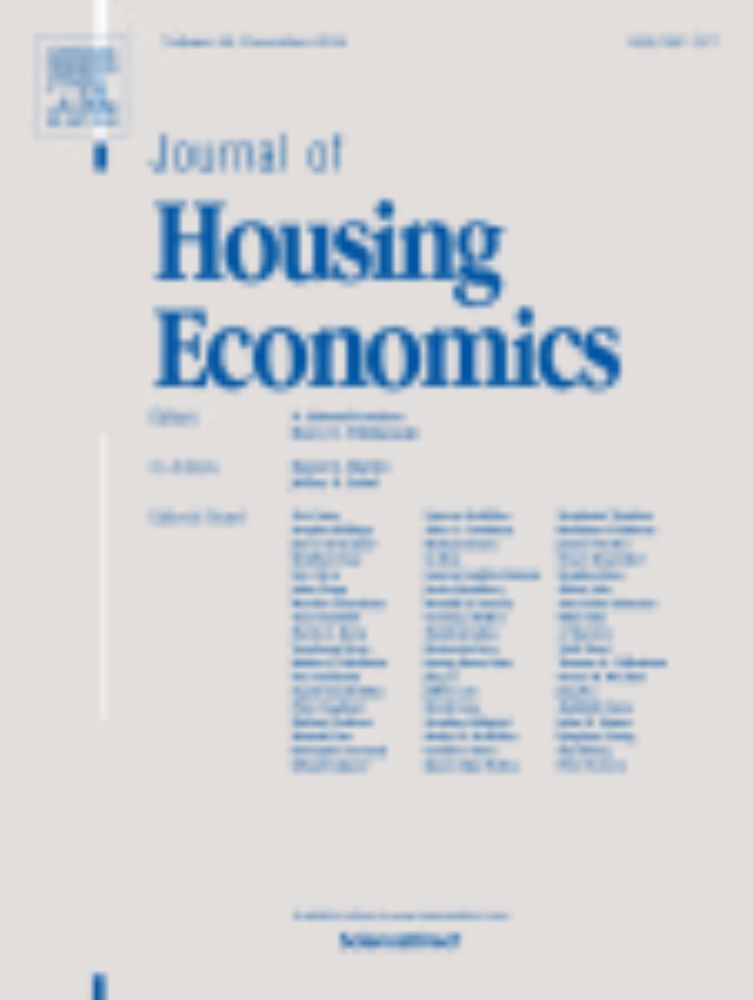
Going it alone: The impact of upzoning on housing construction in Lower Hutt
This paper studies a sequence of zoning reforms enacted in Lower Hutt, a constituent municipality of the wider Wellington metropolitan region of New Z…
🚨urban economics research siren 🚨
A new (open access) paper considers the effects of upzonings in Lower Hutt, New Zealand.
tldr
- housing permits ⬆️ by ~10-18%
- rents ⬇️by ~21% vs counterfactual
These effects are for the metropolitan region.
sciencedirect.com/science/arti...
20.01.2025 08:44 — 👍 24 🔁 13 💬 3 📌 2
Trade makes everybody better off.
The Council for Canadian Urbanism #CanU is a national organization of leading multi-disciplinary urbanists championing better city-building coast-to-coast! linktr.ee/canurbanism Conseil pour l'Urbanisme Canadien
The #15MinuteCity: putting people at the center of urban transformation.
Posts by Dan Luscher.
*Interested in tech and cities*
Director of the Smart City Management masters programme at Zigurat Institute of Technology | Co-director of Sheffield Digital | Founder of Unfolding ltd.
40 years of experience in the energy transition. Building Common Futures, a new energy transition consultancy.
Posts about energy, climate, Ukraine & more.
Also on Mastodon.
Reposts not an endorsement, views my own. #EnergySky
Associate Professor in Sustainable Urban Energy Systems #Complexity #ComplexSystems #Energy #Climate
Environmental scientist - working on risk, climate adaptation, NBS and urban issues - bridging the gap between climate information providers and users.
Connecting the Netherlands and the world to bring cycling to everyone, everywhere.
dutchcycling.nl
Urban planner, climate action leader, transit enthusiast, map nerd. Check out my Toronto laneway and garden suites permits web map at https://arcg.is/1vTDSz
Associate Professor of Civil and Mineral Engineering, @uoft, Canada Research Chair Sustainable Infrastructure. Research: How should we literally build the future? Industrial Ecology. Cities. Transport. Construction.
Climate, cities, equity & law. Sabin Center for Climate Change Law, Sustainable Cities Fund and some other places.✨ MKE & NYC. 📚: “Urban Climate Law”
Professor studying cities, infrastructure, climate, energy, long bike rides, the Boston Celtics, & the drop serve. Personal account representing only me. Likes, reposts ≠ endorsements.
Policy nerd - urban planner - map fan 🏳️🌈. Director of City Climate Research at C40 Cities. Ex Transport for London, City of Stockholm and Metro Vancouver TransLink. Opinions are my own or borrowed from someone smarter.
Asst prof at Sheffield Uni.
climate-changed cities, politics, and markets.
ICLEI's Cities Biodiversity Center is hosted by ICLEI Africa & works to mainstream #naturebasedsolutions across the world.
Join #CitiesWithNature now!
ICLEI is a global network of more than 2,500 local & regional governments committed to #sustainable urban development.
Local action for global change!
Political Science Asst Prof | Canada Research Chair & Director, Research Institute for Urban Wellness @MacEwan University
Cities, networks, climate governance and urban wellness
I talk a lot about motherhood (in academia)
Senior Lecturer in Planning @ Uni of Liverpool. Public disengagement from planning for energy futures, inclusive cities, climate communication.
APTA leads public transportation in a new mobility era, advocating to connect and build thriving communities.
#Mobility #Future #Urbanization | Community for women working in the mobility sector |🇩🇪 🇪🇺 www.womeninmobility.org
